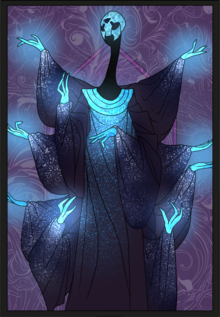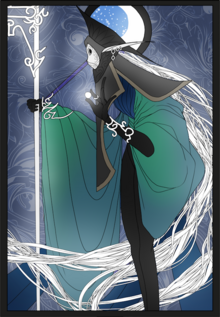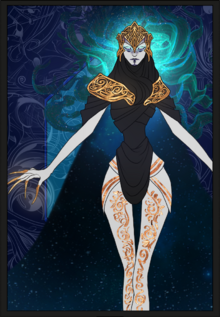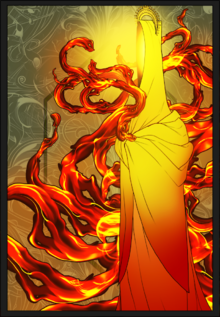Abridged Version
Origins
Virtues
Estelley does not have a formal set of Vices and Virtues, but rather so-called Standards of Perfection. Standards of Perfection are general life-goals and ambitions the faithful should strive towards. It is common for Elves to choose one patron God or Goddess (often of their own Race, though others are also possible), or multiple, choosing their Standards of Perfection as something to strive towards and reach. Once they feel confident they have met the Standard, they seek out Estelley Priests and undergo the Trials of Preparation, where the priests trial their perfection, sending them back to learning if they fail, and giving them a blessing and official recognition to their Ascendance. Estelley Faithful as such go through life seeking Ascendances, with most faithful having completed several Ascendances by the time they reach advanced age.
- Melca's Standard of Perfection is foresight to understand the troubles of the age, and to be well-informed and properly prepared for all eventualities that might arise.
- Leyon's Standard of Perfection is both having the strength and endurance to protect one's self, but also to protect others around one's self, even for no benefit to self.
Gods and Goddesses
Estelley has several Gods and Goddesses, making it a polytheistic Religion. Technically Estel is the greatest entity of the Estelley faith, but Estel is considered in slumber and not interacting with the wider world, having instead sent her divine messengers (the Gods and Goddesses) to preach the gospel and guide the people on the path of virtue. The Faithful can worship only one divine entity, or multiple, or all of them, generally speaking the Gods all represent some aspect of society and the needs of the people, though the pious see lessons and worth in worship for all of them.
Melca, Mother of Sihndar
|
|
Melca is the Goddess of mystery, danger, the unknown, and preparation for adversity. Melca is the patron Goddess of the Sihndar, but she finds worship among the other Elves also, for those who see the signs of calamitous times to come, and seek divine knowledge and preparation to weather the storm. Melca appears as one of the Drovv, a now extinct Race that was the first Race to be wiped out during the last Void Invasion, Melca appearing to the Elves who had traveled to Drowda and assumed the task of fighting back the Demon Invasion. Melca is prayed to for foresight of future problems and disasters, giving visions of troubling times to come, and sending cryptic hints to avert ruin. She is sometimes also called the Spider-Mother, and it is said that spiders whisper her secrets to the faithful. The largest Temple to Melca is the Temple of Dark Premonitions in Xaster Xan-Xavacellon, an unusually ornate building in an otherwise dreary and brutalist architectural settlement. Melca's holy warriors are the Blue Sky Wardens, wearing glowing and glittering Melcarite (depicted in the art) armor, that was traditionally worn by the Drovv people, traveling the world in search of new weapons to wield against future calamities.
|
|
Leyon, Father of Lanlath
|
|
Leyon is the God of protection, benediction, compassion and Radiant Magic. Leyon is the Patron God of the Lanlath, but he finds worship among other Elves also, for those who seek protection from the physical and magical dangers of the world, and those who wish to learn the wonders of Radiant Magic. Leyon appears as an Ancient Elf with the mask of the Moon Walkers, holding the Key-Staff to the Elven afterlife and protecting their paradise from incursions. Leyon is prayed to for durability of armor, endurance of the body, mental fortitude of the soul and mind, and to send protectors in times of need. It is said that Leyon can appear to those on the path of evil, speaking not, but tapping their foreheads granting visions of their terrible demise should they follow the road to ruin. In many ways, Leyon is considered the moral guidance of the Elven Races, as he generally stands for all things good in civilization. The largest Temple to Elleyon is the House of Lunar Eclipse in the capital of the Lanlath Empire, the Valley of the Wind, the only Lanlath pocket-realm open to outsiders. Leyon's holy scribes are the Radiances, who travel the world healing the darkness of Sinistral Magic, and teaching Radiant Magic as Mentors.
|
|
Cemaan, Mother of Teledden
|
|
Cemaan is the Goddess of power, subjugation, supremacy, war, and destruction. Cemaan is the Patron Goddess of the Teledden, but she also finds worship among other Elves, for those who seek Elven supremacy over the upstart Ailor, or who in general seek overlordship and power over others. Cemaan appears as an Ancient Elf with the cloak of the forever infinity, her long fingers spread out and gaze intent on all of the world for conquest. Cemaan is prayed to for loyalty and subservience in subordinates, power and wit to destroy one's enemies, and success in politics and the field of battle to gain as much control as possible. Cemaan is largely the reason why the Teledden manifest their destiny through slavery and conquest, as she teaches them a uniquely megalomaniac and destructive worldview where all non-Elves are lesser than the purest of Allorn people. She is, unsurprisingly, the patron goddess of the Allorn Empire. The largest Temple to Cemaan is the House of Unbroken Chains, which houses a massive underground slave market built to break the wills of the vanquished, in the capital of the Allorn Empire. Cemaan's blessed are the Sinistral Cardinals, who travel the world to extend their power through Sinistral Magic.
|
|
Avinla, Mother of Suvial
|
|
Avinla is the Goddess of fire, life, fertility, respect for the environment, and survival. Avinla is the Patron Goddess of the Suvial, but she also finds worship among other Elves, for those who seek to turn an uninhabitable wasteland into a thriving livable habitat and a vibrant society. Avinla appears as a cloaked figure made of raging fires, crowned with the tiara of motherhood and the rising sun, surrounded by the fires of light. Avinla is prayed to for good health in children and childbirth, good sunlight for crop growth, the warmth of life to keep away death and the cold embrace of Amelaan. Amelaan and Avinla are not strictly enemies, though in the religious narrative, Avinla is prayed to, to keep away the harbinger of death. Avinla led the Suvial people into the Suvial lands and helped create a prospering society there, but the Goddess was petrified by sacrificing herself to prevent Kathar dark magic from wiping out the Suvial, creating a predicament in which the Suvial cannot die and are constantly reborn in the fires of Avinla's Temples. Avinla's largest Temple is the House of Dhruvagni Niketa. Avinla's blessed are the Warmwatchers, who travel the cold lands in the north to extend the warmth of compassion to those caught in sadness or the cold.
|
|
Aseia, Father of Maquixtl
|
|
Aseia is the God of knowledge, libraries, knowing secrets and inner understanding. Together with Mana, Aseia makes up the other half of the Maquixtl Gods. As Maquixtl ideology split in half, so too did the Goddess Manaseia become Mana and Aseia, with Mana representing the Sentli and Xotik, and Aseia representing the Chantli. Aseia's patronage towards the Chantli is related to their search for knowledge, and inner exploration to become a perfect being or creation, which requires the immense wealth of genetic information that exists in the world. Aseia is however also worshiped by other Elves, particularly because he is the God of libraries and ancient archives, said to know things that were lost to time, and things not yet having occurred in time. Tonally, Aseia and Mana even though having come from the same Goddess together, are also an analogy of the struggle of nature and science, instinct and nurture, and how the two seem forever separated. There is a common trend to depict them as lovers, seeking to re-unite, but being unable to bridge their differences to become one Goddess of all realities again. Aseia's blessed are the Eternity Scribes, Elves who dedicate their whole life to recording information and acting as walking libraries to other Elves and those respected enough to be allowed to browse their mind, sometimes also referred to as Ancestor Oracles, because their knowledge is so profound it approximates Magic. Aseia's largest Temple is the Heavenly Stairway on a small island in the west of the Allorn Empire.
|
|
Mana, Mother of Maquixtl
|
|
Mana is the Goddess of community, compassion, kindness, forviging and honesty. Together with Aseia, Mana makes up the other half of the Maquixtl Gods. As Maquixtl ideology split in half, so too did the Goddess Manaseia become Mana and Aseia, with Mana representing the Sentli and Xotik, and Aseia representing the Chantli. Mana's patronage towards the Sentli and Xotik is related to their co-habitation in peace with other Races, and their stewardship of nature and its animals. Mana is also worshiped by other Elves, particularly because she is a Goddess of healing and solace, with many Elves still suffering in the wake of the Allorn Empire from all manner of magical and mental ailments. Mana's name is invoked for good health and reprieve from all things seeking to destroy Elves. Tonally, Aseia and Mana even though having come from the same Goddess together, are also an analogy of the struggle of nature and science, instinct and nurture, and how the two seem forever separated. There is a common trend to depict them as lovers, seeking to re-unite, but being unable to bridge their differences to become one Goddess of all realities again. Mana has no formal largest Temple, as the House of Four-Clover Healing was destroyed in the Night of the Weeping Stars. Her faithful, the Grove-Wardens, however plant large Mana-Trees, sentient Magical trees that can be communed with through priests for guidance, in faraway places to create peaceful floral groves, one such also existing in Regalia.
|
|
Priestly Activities
Trivia




